- Home
- Martha Freeman
The Orphan and the Mouse Page 5
The Orphan and the Mouse Read online
Page 5
“What did you do wrong, Mama?” asked Millie.
“Why can’t you come with us?” asked Matilda.
The questions stabbed Mary’s heart.
“I don’t know if I did anything wrong,” she told her daughters honestly. “But bad things happen, and sometimes it’s for no reason. When they do, I suppose, goodness must be its own consolation.”
Millie and Matilda looked at each other and blinked. What was Mama talking about?
But Margaret—her anxious pup—understood a little.
“Tell us a story, Mama,” Margaret said. “Tell us a story to make us feel better.”
Mary did not believe there was such a story. But she began anyway: “Once upon a time,” and the gift of a story was given. It was the last episode in the tale of Stuart Little, when the dapper young hero leaves behind a star-crossed romance, the town of Ames’ Crossing, and a telephone company repairman to drive north into the great land that stretches before him, adventuring in search of his lost love, Margalo.
“Did he find her, Mama?” asked Millie.
“Shhh, silly, that’s not the point,” said Margaret.
“Seems like it ought to be the point,” said Matilda.
“I don’t know if Stuart found her,” said Mary. “But he never stopped believing he would, and he never stopped trying.”
Mary was going to say something wise about Stuart’s quest, her own inadequate attempts at goodness, and the bravery all of them would need to face the future, but she heard a noise outside her nest; the guard was coming.
It would never do for her pups to worry about her. If they were to carry on with strength and confidence, they must think she was doing the same. So she arranged her ears, sat up straight on her haunches, and curled her tail neatly into a coil.
“Let us touch noses, each of us, one last time,” she said. “Auntie Edna will take good care till you’re out on your own. And think of me sometimes, please”—her voice caught—“just as you think of your papa.”
Chapter Nineteen
Emotionally exhausted, still suffering the consequences of the predator’s attack, Mary Mouse slept hard that day and awoke with a start.
What time was it? Why had no one waked her? She was in her own familiar nest, but it was so quiet, and the comforting mousy aroma seemed thin.
Then she remembered. It was dusk, judging from the quality of light in the pathway outside, and she was alone. Every mouse she’d ever known was gone.
Mary indulged herself with a sigh, thinking of all she had lost and how unfair it was.
Then she got up, groomed her ears and paws, and trotted for breakfast to the nearest larder, where she beheld an awesome sight: morsels of every taste, color, and texture—salty, sweet and sour, crunchy, tender and chewy—all arranged in neat piles, and all for Mary.
“Why, of course,” she said aloud. “They didn’t have a way to carry the comestibles.”
Gratefully, Mary inhaled the stale scent. It wasn’t the same as companionship, but it was something.
Then she set about choosing her meal—a bit of salmon loaf, half a lima bean, and a crumb each from a graham cracker and a gingersnap. When she wiped her whiskers, she was stuffed.
“But I mustn’t always have two desserts,” she told herself. “If there’s any hope of my avoiding the exterminator, I have spying to do. And spying means climbing.”
Every Cherry Street mouse knew that the best time for spying was in the evening around eight o’clock. That was when the boss’s mate drove his automobile to the shelter, parked on the street, let himself in through the front door, climbed the stairs, and paid a visit during which he and the boss conversed while sipping amber-colored liquid.
The boss was not typically talkative, but during these conversations she had revealed many secrets useful to mice. A single mouse could not monitor the humans as thoroughly as a whole network of spies, so Mary was determined to take advantage of these nightly opportunities.
As far as mice are concerned, plumbing exists for the convenience of mice. Now Mary set out to climb the cold-water pipe to the boss’s apartment, a full 180 mousetails distant. Climbing at her usual rate of twenty mousetails per minute (mpm), she ought to be there before the judge arrived.
But she hadn’t considered her injured shoulder. It was still painful, and by the time she reached the second floor, she was breathless. She paused to recover herself and stretch, then commenced to climb again—never looking down.
Not for nothing do mice have big ears. It was the echo of the scratch of paws on pipes that told Mary she’d achieved her goal. A moment later, she heard two distinct human voices. Judge Mewhinney—the boss’s mate—had already arrived.
Mary dropped off the pipe, assessed her options and decided to squeezed through a hole that led to a cupboard. There she was in luck. The cupboard doors did not close tightly, and through the gap, she peered across the smooth floor of what appeared to be a kitchen and into the lighted parlor.
Mary sniffed, inhaling the scents of soap, floor wax, dust . . . and smoke from the judge’s cigar. Like all mice, Mary hated and feared smoke. It was all she could do not to cough and attract the attention of the predator. She could smell him as well, and a fit of trembling assailed her. With a great effort of will, she mastered it. She had to spy if she was going to avoid the exterminator. She would be careful. She would stay out of sight. The predator would never know she was there.
The boss was speaking.
“. . . Polly’s associate at the lying-in hospital . . . a blond male born today.”
“And the mother?” Judge Mewhinney asked.
“Unwed,” said the boss.
Judge Mewhinney’s voice conveyed his smile. “A bit of luck, then. But are you prepared to act so quickly?”
“If the girl doesn’t cooperate, I’ll have to have a talk with our friend the sheriff,” said Mrs. George. “And Polly may have to manage without a nurse. But on the whole, yes. I am prepared.”
“What about Miss Grahame?” asked the judge.
“I’ve spoken to her private secretary. She seems to think a larger hotel suite and some baby formula are all that’s required.”
“So, smooth sailing, then.” The judge puffed on his cigar, filling the small space with the acrid smell of smoke.
“I hope so,” said Mrs. George, “but I don’t want to keep the child a moment longer than we have to. It’s not only Polly. I don’t like what I’m reading about the sheriff being challenged. Someone new might take a hard look at our operation.”
“And put us out of business?” said the judge.
After that, the boss must have turned her head, because her words were muffled. Mary became fretful. For all she knew, the boss was naming the date for the exterminator! She had to be close enough to hear.
Silently, Mary squeezed through the gap between the doors, scurried across the linoleum, and hid beneath the cupboards’ overhang. From there, she could see the boss’s stockings and high heels, one of the judge’s shiny brown shoes, and the back of his armchair.
Mary tried to concentrate on the conversation, but the word exterminator did not come up, and she was distracted by the stuffing in the armchair. It looked to be of excellent quality. Perhaps she should establish a winter home for herself here? It was warmer at high elevations.
The judge’s feet shifted, recapturing Mary’s attention. “Miss Grahame by all accounts is wealthy. How much this time?” he asked.
“Leave that to me,” said Mrs. George.
“Helen, may I remind you I run a considerable risk?”
The boss’s voice softened. “We both run a risk, my dear. And your contribution is invaluable. Still, it’s better if you don’t know every detail. What if you were questioned? With that new bunch trying to take over City Hall—”
“They wouldn’t question me. Would they?” When his voice squeaked, the judge sounded almost like a mouse.
“Surely not. But it’s better to be safe than sorry.”
Still nothing about an exterminator, and Mary’s mind had drifted back to the armchair stuffing and her winter home when all at once she realized that the judge had taken another puff on his cigar, and the smoke was tickling her throat, and she must retreat lest she make a noise to attract attention. . . .
She started to turn but was too late. A single step, and the worst happened: Mary coughed.
Chapter Twenty
In Gallico’s dream, he was tormenting the twitching tail of a vanquished lizard. It was lovely, which was why he felt more than the usual resentment when the rodent’s sneeze awakened him.
The humans, oblivious to the impending drama continued their chatter. Really, it was amazing that humans ever accomplished anything, given their minimal sensory abilities. By rights, felines should run the world, with canine slaves providing muscle.
True to his species, Gallico was slow to rouse, but once on his feet moved quickly. In an instant, he was crouched and taking aim. Stupid rodent, he thought. Does she think I can’t see her there?
Behind him, the boss said, “What is that cat up to, do you think?”
And the judge answered, “He’s got his eye on something.”
Gallico set his body and sprang, but the rodent made a last-second course adjustment and the cat came up a half claw short.
Now Gallico was mad. The boss had scolded him for failing to kill that female the other night—as if interference by a human kitten had somehow been his fault. The boss had also accused him of being lazy, which was ludicrous. How could she expect him to maintain his good looks without the requisite beauty sleep?
This time, Gallico would not fail. This time, no human kitten would come to the rescue. This time the rodent was on her own.
Chapter Twenty-One
Disoriented by fear and surprise, Mary sped across the floor and arrived at the wrong cupboard, one whose doors closed tightly enough that she could not slip between them. The predator was close now, so close she could smell its bloodthirsty breath even over the cigar smoke.
I’m done for, she thought. No one cares about an exile. No one will even know I’m gone.
But then . . . an image flashed in her mind, the hero Stuart Little facing down the wicked white feline, Snowbell. Miss Ragone had shown the picture to the children when she read the book aloud, and the mice auditors had seen it, too, and been impressed.
Stuart Little had overcome his fear. Stuart Little had not given up.
I won’t, either, Mary thought. The stupid beast’s sheer size might prove decisive, but I will go down fighting.
Emboldened, Mary wheeled to confront the predator head-on. She did not cower but placed her paws solidly, bared her not-inconsequential teeth, and flexed her muscles. Prepared to jump at the big brute’s throat, she let out a ferocious squeak and—what do you know?—the furry coward flinched.
In the parlor, shoes shifted. “What was that noise? What’s that cat up to?”
The human speech diverted the predator’s attention, and Mary ran for it. This time she located the cupboard she wanted, squeezed between the doors, and arrived safe, enclosed, and in the dark—her heart pounding.
“Blast!” the boss said.
“More mice?” the judge asked.
And that was the last Mary heard before she grasped the cold-water pipe and, aided by gravity, sped down, down, down to mouse territory on the ground floor.
Chapter Twenty-Two
Mary couldn’t exactly call her first spy mission successful.
She had learned nothing important.
She had nearly been eaten.
And while she wasn’t sure the boss had seen her, the boss had certainly suspected her presence. If anything, extermination was more likely than ever now.
Mary Mouse was discouraged and exhausted. And the worst part was, she had to spy again the following day—every day—if she was to protect herself. Somehow she would have to find a way to hear what was said while steering clear of the predator.
For now, she deserved a snack.
She was rounding a corner on the pathway to the larder when she smelled something unexpected: fresh droppings that were not her own.
She stopped. She looked around. She spotted the source . . . and tried to explain it away. Maybe the droppings were older than they smelled? Maybe she just hadn’t noticed them before?
But all the time, she knew the truth. An intruder had entered her territory. A male.
Historically, the Cherry Street colony had been forced to defend its shelter repeatedly against raids and even outright invasion. Under Randolph’s predecessor, defensive capabilities had been improved such that the colony gained a reputation for impregnability, deterring any potential attack. While Mary herself had been born in an era of unprecedented peace, she knew that Randolph had allowed colony defenses to deteriorate.
Did the intruder represent a force hoping to conquer a poorly defended colony? Or did he know that Mary was in fact all alone?
Her mind in turmoil, Mary heard scuttling nearby, turned her head, and beheld an unfamiliar male with the wild look of the outdoors about him, rangy, muscular, and untidy compared to the males of the territory, who were well fed and committed to good grooming.
This was a marauder mouse for sure—a pirate, a raider, a dangerous outlaw. Squealing would be to no avail. Mary looked around for a weapon but found nothing useful.
Meanwhile, the male skipped the formalities. “As I live and breathe! You scared me half to death! But tell me, where has everyone got to?”
Mary hardly knew how to reply.
“Predator got your tongue? Ha ha ha ha ha!” said the male.
So okay, maybe this fellow wasn’t the advance guard of an enemy force. In fact, he seemed more ridiculous than threatening. But he wasn’t making a good impression, either. Mary looked him up and down, then raised her pure-white whiskers and gave the traditional greeting for a stranger: “Did you travel far?”
“Ha ha ha ha ha!” said the male. “How courteous you are. Yes, rather far. And there’s no need to worry, my dear. I am not scouting an invasion. In fact, I am a member of the Cherry Street colony, same as—I infer—you are. So where’d everybody go, anyhow?”
Not wanting to reveal she was an exile, Mary answered with a question: “If you’re a member of the colony, then why are you traveling alone?”
“I might ask why you’re alone as well,” said the male. “An outcast, are you? Not dangerous, I trust? You’re right to be prudent, you know, a defenseless damsel in your position.”
Mary arched her back, raised her hackles, and glared. Who was he to call her a defenseless damsel? Hadn’t she just faced down a predator?
Her assertive posture did not have the desired effect. In fact, it was met with another blaring “Ha ha ha ha ha!” followed by “Look, can we go somewhere to chat? There’s hours yet till daylight, and I’d love to get off my paws. I’ll be glad to tell you where I came from, my whole life story. But just now I’m peckish, and from the looks of the larder—I hope you don’t mind that I peeked—you’re admirably stocked with comestibles.”
Hmph, Mary thought. And yet—maybe I’ve misjudged him? An uncivilized rodent would have eaten first and asked questions later. “Yes, of course. You must forgive my manners. My name is Mary Mouse.”
The male raised his whiskers and dipped his snout. “My name,” he said, “is Andrew.”
Chapter Twenty-Three
While Mary and the intruder chatted, Mrs. George slept. In the morning, she came downstairs as usual, sat at her desk with her coffee and newspaper, and prepared to face the challenges of the coming day. Among her talents was lying, and this morning she would put that talent to use. Later, she would make time at last to meet privately with Carolyn.
From Matron, Mrs. George knew that Carolyn had not been her usual cheerful self since the insult—and this would not do. The children relied on Carolyn’s good humor. And so did Mrs. George.
How to make the child feel bet
ter? How to restore her confidence?
Mulling over these questions, Mrs. George had an idea that made her smile. Maybe the lack of a baby nurse would not be so hard on Polly after all. Carolyn had a maternal streak. It was one of the qualities that drew the other children to her. The coincidence, she thought, just might work out very neatly.
As usual after breakfast, Mrs. George made her announcements to the staff and the children. Then she set the time to meet with Carolyn and returned to her office with Matron Polly. There the two reviewed the schedule at the lying-in hospital. It was eight-fifteen now; healthy babies were brought to their mothers for nursing between nine and ten. It would take Mrs. George fifteen minutes by car to get to the hospital. Polly’s associate would meet her outside.
From her wallet, Mrs. George withdrew the envelopes she had prepared Monday morning and gave them to the matron, who put them in the pocket of her apron. “Thank you, ma’am,” she said, but there was a frown on her face.
Mrs. George raised her eyebrows. “I’ve given you what we agreed on.”
“Yes, ma’am. Only . . . well, it’s a nasty business, and—”
Mrs. George cut her off. “This is an inopportune time to lose heart, Polly. We have done this before.”
“Yes, ma’am.”
“We are giving the child an opportunity.”
Polly did not look certain but repeated, “Yes, ma’am.”
Polly and Mrs. George had first become acquainted two decades before, shortly after Mrs. George moved to Philadelphia. At the time, Polly was the young and foolish girlfriend of a speakeasy’s proprietor. When she became pregnant, he departed for parts unknown, never knowing his baby had been miscarried.
Polly was heartbroken at the loss of her beau and the loss of her child. Her life improved when Mrs. George became headmistress at Cherry Street and invited her to live in and oversee the girls. Mrs. George rightly anticipated that Polly’s placid disposition was well suited to working with children . . . and to working for Mrs. George.

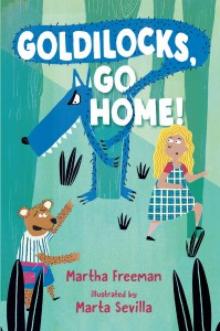 Goldilocks, Go Home!
Goldilocks, Go Home!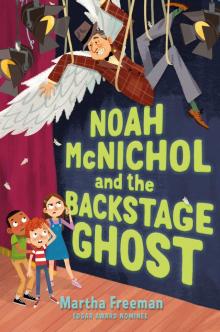 Noah McNichol and the Backstage Ghost
Noah McNichol and the Backstage Ghost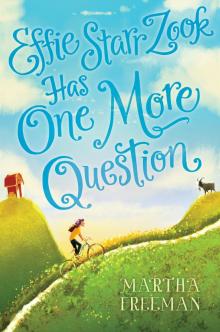 Effie Starr Zook Has One More Question
Effie Starr Zook Has One More Question P.S. Send More Cookies
P.S. Send More Cookies The Secret Cookie Club
The Secret Cookie Club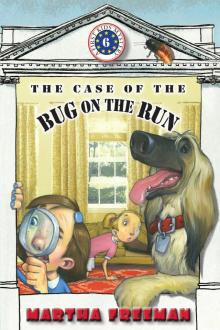 The Case of the Bug on the Run
The Case of the Bug on the Run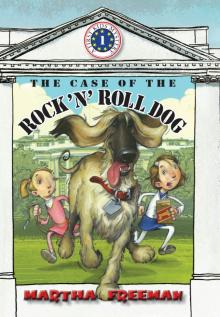 The Case of the Rock 'n' Roll Dog
The Case of the Rock 'n' Roll Dog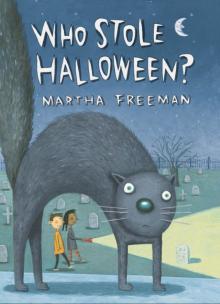 Who Stole Halloween?
Who Stole Halloween?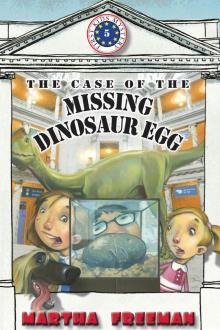 The Case of the Missing Dinosaur Egg
The Case of the Missing Dinosaur Egg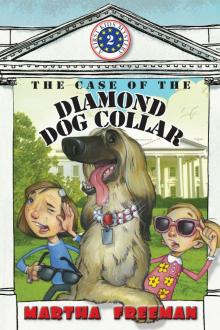 The Case of the Diamond Dog Collar
The Case of the Diamond Dog Collar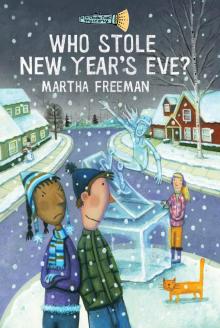 Who Stole New Year's Eve?
Who Stole New Year's Eve? Strudel's Forever Home
Strudel's Forever Home Campfire Cookies
Campfire Cookies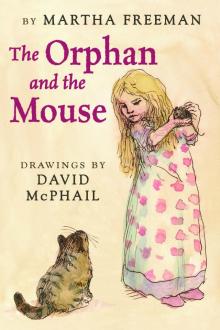 The Orphan and the Mouse
The Orphan and the Mouse Zap!
Zap!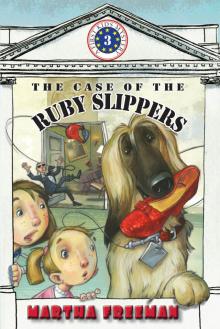 The Case of the Ruby Slippers
The Case of the Ruby Slippers